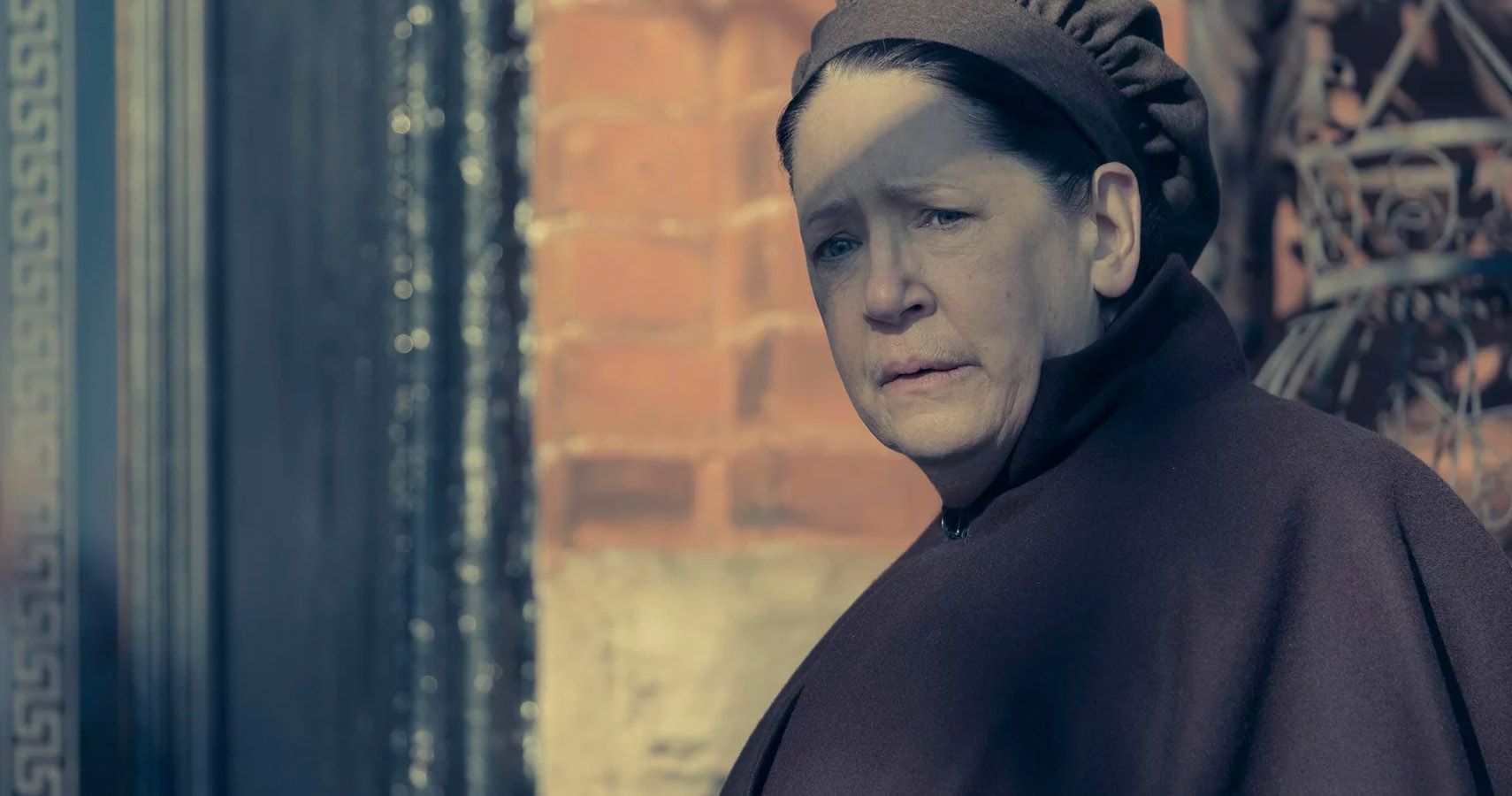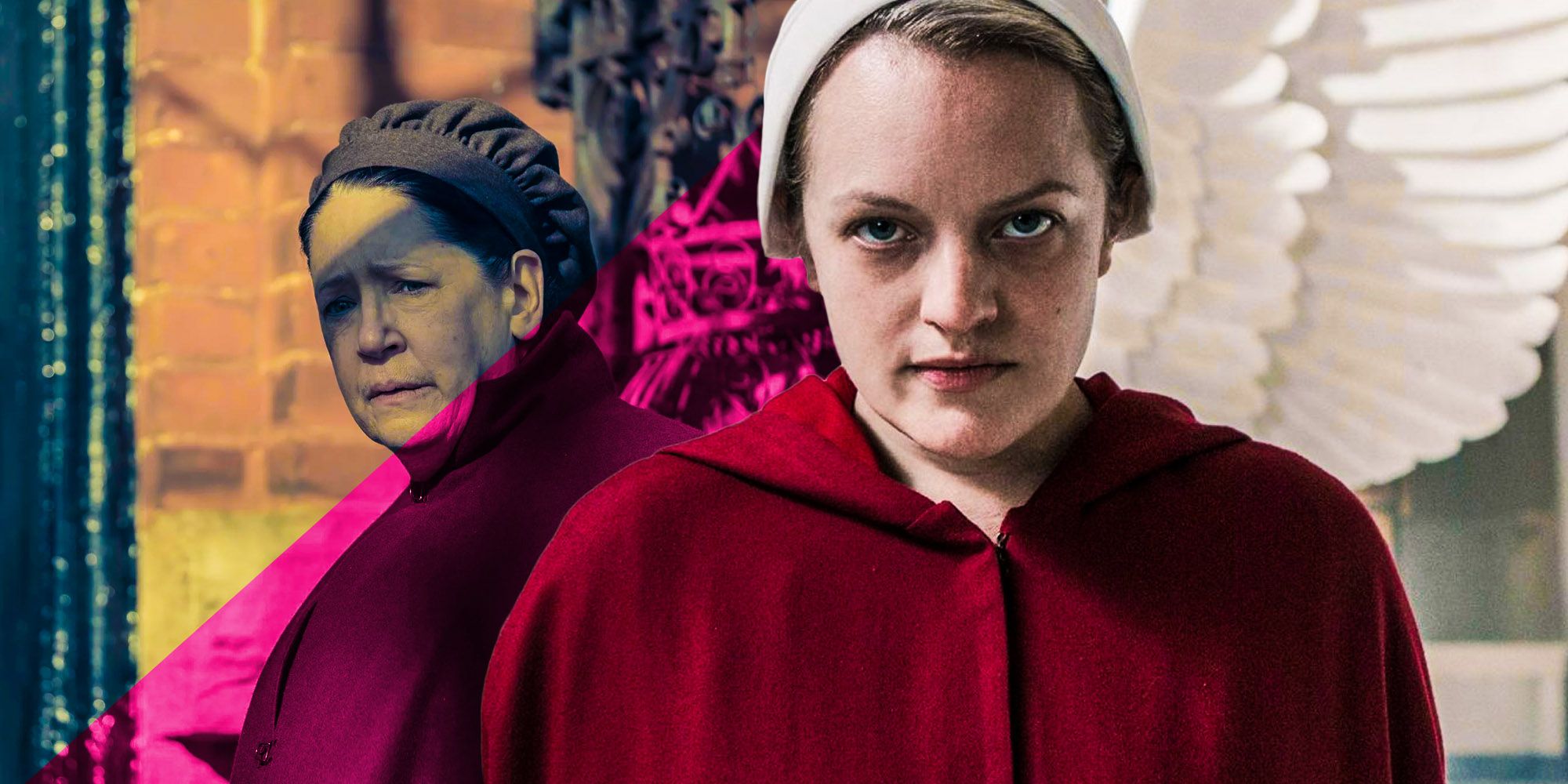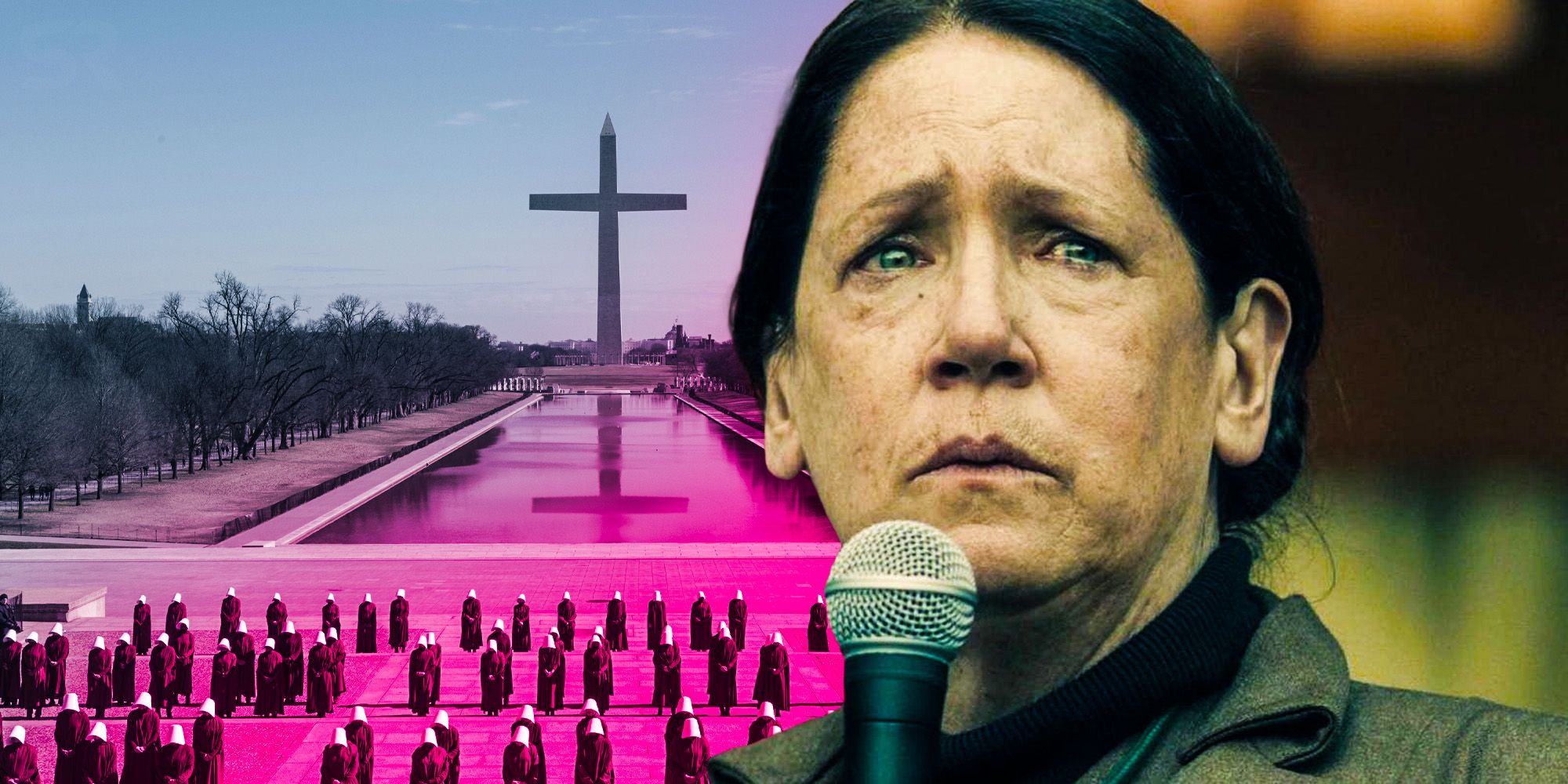Aunt Lydia Handmaid’s Tale – A Deep Character Look
When we think about the characters who truly shape the unsettling world of Gilead, a certain figure often comes to mind. That, is Aunt Lydia, a person whose very name sends shivers down the spine for many who have watched or read "The Handmaid's Tale." She is, in some respects, a central force in the lives of the handmaids, a teacher whose lessons are anything but gentle. Her presence looms large, whether in Margaret Atwood's original book or in the compelling television series from Hulu, where she takes on a very memorable form.
This individual, known more formally as Lydia Clements, carries a title that implies a certain kind of guardianship, yet her actions are far from nurturing. She stands as a key figure within the Rachel and Leah Center, a place where young women are, quite literally, shaped for a very specific and often brutal existence. Her role there, along with others who share her title, involves instilling the strict rules and beliefs of the Gileadean system, ensuring compliance through methods that are, well, rather harsh.
The portrayal of this powerful figure by actress Ann Dowd has, in fact, given her a face and a voice that many viewers can't easily forget. Dowd brings a compelling intensity to the character, allowing us to see not just a villain, but a person with a complex history that, you know, helps explain some of her most difficult choices. Her performance really helps to bring the full weight of Aunt Lydia's influence to the screen, making her a truly unforgettable part of the narrative.
Table of Contents
- Biography of Aunt Lydia - Handmaid's Tale
- Personal Details of Aunt Lydia - Handmaid's Tale
- What is Aunt Lydia's Role in The Handmaid's Tale?
- How Did Aunt Lydia - Handmaid's Tale - Become Who She Is?
- The Changing Face of Aunt Lydia - Handmaid's Tale
- Is Aunt Lydia - Handmaid's Tale - a Villain or Something More?
- Aunt Lydia's Influence and Impact in The Handmaid's Tale
- What's Next for Aunt Lydia - Handmaid's Tale - in The Testaments?
Biography of Aunt Lydia - Handmaid's Tale
Lydia Clements, a name that might sound quite ordinary on its own, takes on a very different meaning when paired with her title, "Aunt Lydia." She is, basically, a character deeply embedded in the narrative fabric of Margaret Atwood's widely recognized book, "The Handmaid's Tale," and then brought to vivid life in the Hulu television adaptation. Her presence is, in fact, one of the most memorable aspects of the entire story, defining much of the harshness faced by the handmaids.
As one of the several "Aunts," her primary duty involves instructing and guiding the young women at the Rachel and Leah Center. This facility is, quite literally, where handmaids are prepared for their assigned roles within the strict Gileadean social structure. Her instruction is not, by any means, gentle or encouraging; it's a process of breaking down and rebuilding, designed to ensure absolute obedience and conformity to the new societal norms. She is, therefore, a figure of authority and, really, a symbol of the oppressive system itself.
The character of Aunt Lydia is brought to the screen by the incredibly talented actress Ann Dowd. Dowd's portrayal is, without a doubt, a standout performance, capturing the nuanced cruelty and, perhaps, the hidden complexities of this rather imposing woman. Her work helps viewers understand how such a character could exist and, indeed, thrive within such a brutal society, giving a face to the system's most direct enforcers. She manages to convey a sense of history and inner turmoil, even when Lydia is at her most severe.
- Sydney Sweeney In The Handmaids Tale Rising Star Powerful Performance And Cultural Impact
- Sophieraiin Ed
- 3 Men 1 Hummer
- Abbi Secraa
- Mini Boden
Personal Details of Aunt Lydia - Handmaid's Tale
| Full Name | Lydia Clements |
| Known As | Aunt Lydia |
| Portrayed By | Ann Dowd |
| Primary Role | Teacher at the Rachel and Leah Center; Handmaid Trainer |
| Origin | Margaret Atwood's "The Handmaid's Tale" (book and Hulu adaptation) |
| Previous Occupation | Fourth Grade Teacher |
| Notable Traits | Distorts religious ideas, quotes Jesus to justify regime, motivated by fear and power, ruthless, vivid, fiercely debated character, influential voice. |
| Key Transformations | From teacher to trainer; later becomes a "mole" in "The Testaments." |
What is Aunt Lydia's Role in The Handmaid's Tale?
Aunt Lydia's function within "The Handmaid's Tale" is, in fact, quite central to the narrative's exploration of control and power. She is, first and foremost, a teacher at the Rachel and Leah Center, which means she is directly responsible for molding the handmaids into compliant members of Gilead's society. Her methods are, well, not exactly gentle; she employs a kind of strict discipline, often using fear and intimidation to enforce the rules. This role places her squarely at the front lines of the regime's efforts to control women's bodies and minds.
Her position gives her significant influence over the lives of the handmaids, including June, the story's main character. We see her, in a way, as the direct enforcer of Gilead's doctrines, someone who interprets and applies the rules with an iron fist. She is the one who delivers the harsh punishments and the chilling lectures, ensuring that the handmaids understand the severe consequences of disobedience. This makes her a figure of both dread and, perhaps, a strange kind of twisted guidance for those under her care.
Beyond just training, Aunt Lydia also plays a part in shaping the ideological landscape of Gilead. She, quite literally, twists religious concepts and uses quotes, even from Jesus, to give a false sense of righteousness to the regime's brutal practices. This isn't just about control through physical means; it's also about psychological manipulation, making the handmaids believe that their suffering is, somehow, divinely ordained. This aspect of her role shows how deeply she is involved in the very foundation of Gilead's oppressive system, making her more than just a guard, but a true architect of its beliefs.
How Did Aunt Lydia - Handmaid's Tale - Become Who She Is?
The journey of Aunt Lydia from her earlier life to the formidable figure we see in Gilead is, quite frankly, a compelling part of her story. "The Handmaid's Tale" season three, in one of its later episodes, actually takes a look back into her past. This trip into her history helps to shed some light on her current actions and, particularly, her deep-seated dislike of June. It's almost as if the show is saying, "here's why she is the way she is," providing context for her often cruel behavior.
Before the rise of Gilead, Lydia Clements was, apparently, a fourth-grade teacher. This former occupation presents a striking contrast to her later role as a ruthless handmaid trainer. The transformation from educating young children to overseeing the brutal indoctrination of women is, to say the least, a stark one. This shift, from a relatively benign profession to one of immense power and cruelty, is a key element in understanding her character's development. It suggests that the circumstances of Gilead didn't just change her role, but fundamentally altered her very being.
The narrative also hints at the motivations behind her actions, suggesting that her choices are not solely driven by a belief in the Gileadean cause. While she does distort religious ideas to justify the regime, the novel, in particular, points to deeper, more personal drivers: fear and a desire for power. It's almost as if she embraces the system not just because she believes in it, but because it offers her a position of authority and, well, a sense of security in a very dangerous world. This complex blend of ideology, fear, and a thirst for control helps us understand the path she took to become the woman she is.
The Changing Face of Aunt Lydia - Handmaid's Tale
Aunt Lydia is, in some respects, far from a static character; her portrayal, especially in the television series, suggests a journey of change and evolving motivations. Season three, as we've talked about, gives us a glimpse into her past, showing how she went from a school teacher to a figure of authority within Gilead. This look back is quite important, as it helps us see the roots of her stern demeanor and, perhaps, the reasons for her particular dislike of June, a handmaid who constantly challenges the system. It's a way of showing that even the most rigid characters have a story that shaped them.
The story, however, doesn't stop there. The narrative continues to explore her character, hinting at further shifts, particularly as the show moves closer to the events of "The Testaments." It's almost as if the seeds of rebellion are being planted within her, even amidst her role as a strict enforcer. This suggests that her character arc is, in fact, much more complex than a simple villain. We see her as someone who might, just might, be capable of a significant transformation, moving beyond her current role as an oppressor.
Indeed, in season six, episode nine of "The Handmaid's Tale," we actually witness Aunt Lydia undergoing a truly significant transformation. This particular episode is, well, quite pivotal, as it marks a turning point in her character's journey. It's a moment where her long-held beliefs or, perhaps, her long-suppressed humanity, begin to surface, leading to a profound shift in her overall character arc. This kind of development keeps viewers on their toes, wondering what her next move will be and how she might, in fact, contribute to the future of Gilead, or its downfall.
Is Aunt Lydia - Handmaid's Tale - a Villain or Something More?
Aunt Lydia is, without a doubt, widely seen as one of the biggest villains in "The Handmaid's Tale." Her actions, her methods, and her unwavering dedication to the Gileadean regime certainly paint her in a very harsh light. She is the direct instrument of much suffering for the handmaids, and her ruthlessness is, well, quite clear. From the very beginning, she embodies the oppressive force of the society, making her an easy target for our disapproval and, really, our fear. Her story, from her time as a teacher to her future in Gilead, is deeply intertwined with the suffering of others.
However, the narrative, particularly as it progresses and especially with the introduction of "The Testaments," begins to suggest a more nuanced picture. While her villainy is undeniable, the story also hints at layers beneath the surface. Her motivations, as we've discussed, might stem from fear and a desire for power, rather than pure malice. This doesn't excuse her actions, but it does add a layer of complexity to her character, making her less of a one-dimensional antagonist and more of a product of her environment, or perhaps, a survivor within it.
The possibility of her becoming a "mole" to destroy Gilead in "The Testaments" is, in fact, a truly fascinating development. This potential shift from oppressor to secret agent working against the very system she helped build suggests that her character is, well, far more intricate than initially presented. It makes us wonder about her true loyalties and what might have led her to such a dramatic change of heart. This alliance with June's daughters, for example, would completely redefine her role, turning her from a clear antagonist into a figure of unexpected resistance, making her story one of profound and, really, quite surprising transformation.
Aunt Lydia's Influence and Impact in The Handmaid's Tale
Among all the Aunts in "The Handmaid's Tale," Lydia's voice is, by far, the most significant and, in a way, the most enduring. Her maxims, those stern and often chilling pieces of advice or rules, are constantly recalled by Offred, the story's main narrator, throughout the novel. This means that even when Lydia isn't physically present, her teachings and her presence continue to shape Offred's thoughts and experiences. It's almost as if Lydia lives inside Offred's head, a constant reminder of the strictures of Gilead and the lessons learned at the Red Center.
This ongoing mental presence speaks volumes about her profound impact on the handmaids. Her words are not easily forgotten; they become ingrained, a part of the mental landscape of those she has trained. This kind of lasting influence highlights her effectiveness as a tool of the Gileadean regime, showing how deeply she manages to penetrate the minds of her charges. She is, therefore, not just a physical enforcer but also a psychological one, shaping the very way the handmaids perceive their world and their place within it.
Her character is also among the most vivid and, really, fiercely debated figures in the entire "Handmaid's Tale" universe. People discuss her actions, her motivations, and her potential for change quite passionately. This level of discussion points to her powerful impact on the audience, making her a memorable and thought-provoking part of the story. She is, in fact, a character that truly sticks with you, long after you've finished reading or watching, prompting ongoing conversations about morality, power, and survival.
What's Next for Aunt Lydia - Handmaid's Tale - in The Testaments?
The trajectory of Aunt Lydia's character takes a very interesting turn as "The Handmaid's Tale" television series approaches the events depicted in "The Testaments," Margaret Atwood's sequel novel. Ann Dowd, the actress who brings Lydia to life, has, in fact, given us some hints about what's to come. She's previewed how the final episodes of "The Handmaid's Tale" are setting things up for "The Testaments," suggesting a significant shift in Lydia's role and motivations. This means viewers will see a "new Lydia," which is, well, quite exciting for those who follow her story.
This "new Lydia" is not just a slight adjustment; it implies a substantial change in her character's direction. Dowd has also shared some insights about the "Pearl Girls," a concept that becomes relevant in "The Testaments," further hinting at the intricate future awaiting Lydia. It's almost as if the show is carefully preparing the ground for her transformation, ensuring that her evolution feels earned and believable, even given her past actions. This setup is, really, quite crucial for bridging the two narratives.
Bruce Miller, the showrunner, has also revealed that the final season of "The Handmaid's Tale" is specifically preparing Aunt Lydia's rebellious side for "The Testaments." This confirms the hints of her shifting loyalties and suggests that her journey from a ruthless trainer to someone who might actively work against Gilead is a deliberate and central part of her character arc. Her backstory, her role in the dystopian society, and her potential alliance with June's daughters are all elements that contribute to this fascinating future, making her one of the most dynamic characters in the entire saga. Her character, in fact, experiences a pivotal shift in episode eight of the final season, marking a clear turning point.
So, we've explored the origins of Aunt Lydia, her strict role as a handmaid trainer, and the complex motivations that drive her. We've seen how her character, portrayed so memorably by Ann Dowd, develops from a seemingly one-dimensional villain to a figure with a surprising potential for change, especially as the story moves towards "The Testaments." Her influence, her debated nature, and her shifting allegiances all contribute to making her a truly unforgettable part of "The Handmaid's Tale."

The Handmaid's Tale: The 12 Cruelest Things Aunt Lydia Has Ever Done

Handmaid's Tale: Why June Wants Aunt Lydia To Kill Her

Handmaid's Tale Hints At Why Aunt Lydia Eventually Turns Against Gilead